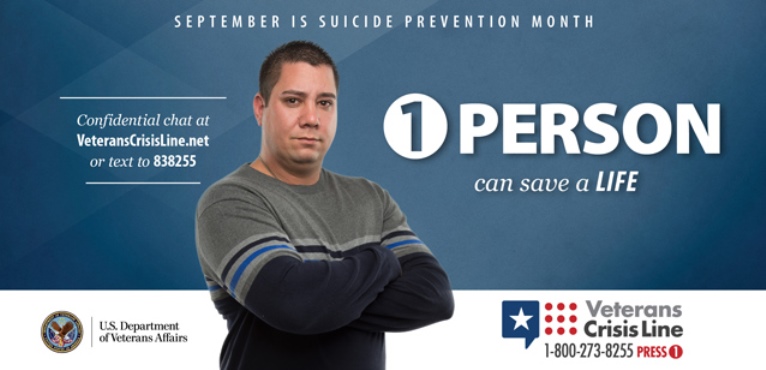More than 40,000 Americans die by suicide each year, with Veterans accounting for an estimated one in five of those deaths. Suicide is also a leading cause of death among active U.S. military members.
That’s why VA has made suicide prevention a top priority. Research is vital in shaping VA’s overall suicide prevention strategy, which covers medical treatment, provider training, community programs, crisis intervention procedures, and policy.
As director of the VA VISN 2 Center of Excellence for Suicide Prevention, based in upstate New York at the Canandaigua VA Medical Center, I have an excellent perspective on what it takes to ensure that VA is consistently providing the best evidence-based life-saving interventions.
Research has identified numerous risk factors for suicidal behavior. These include behavioral health conditions, such as depression; major stressful events, such as the loss of a loved one; and physical health problems, such as chronic pain.
While each of these factors increases risk, none is necessary or sufficient on its own to lead to suicidal behavior. Rather, multiple factors are usually involved. Moreover, research shows that most of those who die by suicide were not in treatment for depression or other mental health conditions at the time of death. Therefore, tackling the complex and far-reaching problem of suicide requires a broad approach. At our Center of Excellence, where I lead a team of researchers, educators and administrators, that means:
- Identifying risk factors and protective factors for suicidal behavior in Veterans broadly and in key subgroups (for example, those with chronic pain).
- Developing, implementing and evaluating suicide-prevention interventions.
- Preparing junior researchers to contribute to the field of suicide research in a variety of ways.
- Providing education on suicide prevention.
Whether we are researchers, medical professionals, friends, families or Veterans, we are all on the front line of suicide prevention. People may not believe that they can make a difference in the lives of others, but they can. One person can help save a life.
In this series of four blog posts, which will be appearing here over the next month, I hope to convey that while suicide is complex, and unfortunately cannot be prevented entirely, we can make great progress by using a well-informed and comprehensive approach.
If you or someone you know is in crisis reach out and call 1-800-273-8255, Veterans and Servicemembers press 1. You can also chat online at VeteransCrisisLine.net, or send a text message to 838255. Confidential support from caring VA responders is available 24 hours a day, 7 days a week, 365 days a year.

Topics in this story
More Stories
Bob Jesse Award celebrates the achievements of a VA employee and a team or department that exemplifies innovative practices within VA.
The Medical Foster Home program offers Veterans an alternative to nursing homes.
Watch the Under Secretary for Health and a panel of experts discuss VA Health Connect tele-emergency care.







horror stories everywhere. when will you take veterans at that word? i all so had to go to the hospital for heart problems ( open heart surgery, 3 stints). the v.a. in Memphis said they had no bed on the second stint so i went to the local hospital. they paid the hospital bill, but not the doctor who put in the stint. i was at the VA clinic in Jonesboro, at, went UN-responses. they sent me to the local hospital by ambulance, the VA in Memphis has not paid that bill either. i am rated AR 130%.
why are they refusing to paid these bill?
U know when u can’t see ur doctor any more, his nurse know telling veteran u go store get this meds, do this, do that, sorry doctor is buzy, but when it 6 months pass the veteran has to cc him/her but the nurse refused the veteran to make that appointment still. This nurse told me wrong thing to take for these headaches I have to pay for the drugs im100% , heath care in the va really hit bottom of the oceans, $1it got so deep that Bob don’t care no more
my through is the v a has a lot to do with this problem. last october i had an emergency ,and had to go to the emergency room through i was dying from an heart attack called the v a like i was spopse to to let them know i was their. well their was no one their to answer the phone and get back to the hospitol with what to do next. that was on a saturday night so we left a message to call us back as soon as posible. never got an answer back from them at the v.a called sunday still the same thing. monday was an holiday of course still no answer. tuesday morning finaly got hold of them on the phone.well anyways the thing is the v.a. will not pay the bill, now still after an apeal twice they still will not pay the bill. this is the first time i had to use an outside emergency room ever sence i startet going to the v,a. in 1998. the reason they say is i could have come to the v. a. and not the emergency room. every time you let your gard down at the va their is someone that is going to bum you out for something down their. it is depressing to say the least,.
Suicide is serious problem since it’s getting more repetitive case these days. Thank you for putting attention on this case. I’m very appreciated. I would love to contribute more whatever I can do. THank you for information too